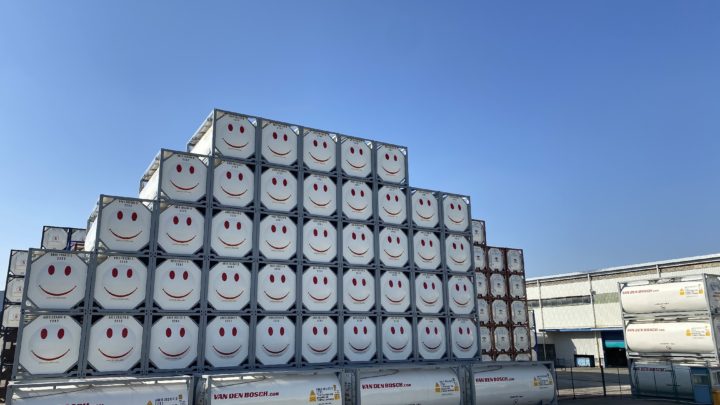
The tanks were immediately put into use, enabling the logistics service provider to respond to the growing demand from the African market for deepsea transport using ISO tanks for the food industry.
Van den Bosch runs its deepsea activities from its branch in Dubai and is now one of the world’s largest tank operators for the food industry. The focus is on the African market with an emphasis on shipping liquid food products, such as olive and sunflower oil, ethanol, glucose and whisky, in tank containers.
“We have been active in Africa since 2014, with a particular focus on developments in the continent,” says Mark Ashton, commercial director of Van den Bosch in Dubai. “Over the years, we have grown with the increasing demand for bulk transport. The purchase of these 500 additional containers reflects that and will support our growth model within Africa.”
In March, the Dubai operation, Van den Bosch DMCC, obtained ISO 22000 certification. ISO 22000 is an international food safety quality standard. The basic conditions for food transport, management elements and HACCP are key parts of this quality management system.
Van den Bosch’s office in the Netherlands and its base in the UK have long been ISO 22000-certified. Ashton comments: “By obtaining ISO 22000 certification, we are endorsing the importance of food safety and proving to our customers that we meet all the quality requirements.”
Sustainable change
Much of Africa still operates in the traditional way, whereby products are shipped in small packages or even flexitanks. So, Van den Bosch has been focusing on setting up and redirecting traditional transport flows to bulk transport.
“ISO tank containers offer an efficient, reliable and sustainable alternative,” Ashton goes on. “Through our current operations in countries such as Ghana, Ivory Coast and Nigeria, we’ve noticed the need for such a sustainable transport solution.
“Investment in the region offers us opportunities to develop further in the African market,” he adds. “This includes countries such as Cameroon, Senegal, Togo and even Sierra Leone. The focus is now on establishing a reliable and available supply of tank containers in these countries. That is the key to sustainable change.”
Ivory Coast cleaning station
Further investment in the African market translates into the construction of new tank cleaning facilities on the continent. A new tank cleaning station is now opening in Abidjan, Ivory Coast. This follows a cleaning facility that opened in Ghana in 2016.
According to Ashton: “For bulk transport to take place, ISO tanks must be available that comply with the proper cleaning requirements. The new cleaning station will be built in full compliance with European quality standards for food, Kosher and Halal cleaning.”
The station is expected to open in the second quarter of 2023.
Driver ruling
In March, the Dutch Supreme Court overturned a prior judgment, instead ruling that Hungarian truck drivers are not entitled to claim Dutch wages.
The case involves a lawsuit brought by 10 Hungarian drivers against their former employer Silo Tank Kft, which is now Van den Bosch Transport Kft.
In brief, various rulings over recent years concern whether the Hungarian drivers should have received Dutch wages for the international transport activities they carried out on behalf of Silo Tank in between 2007 and 2012.
On 2 May 2017, the ‘s-Hertogenbosch Court of Appeal ruled that the drivers were not entitled to Dutch wages. This ruling was overturned by the Supreme Court on 23 November 2018. On 27 July 2021, the Arnhem-Leeuwarden Court of Appeal ruled that the drivers were entitled to Dutch wages.
Now, the Supreme Court has overturned the judgment of the Arnhem-Leeuwarden Court of Appeal. This means that the Hungarian drivers are not entitled to claim Dutch wages. The case is being referred to the Amsterdam Court of Appeal. In doing so, the Supreme Court is following the earlier judgment of the Advocate General. The Supreme Court thus overturns the Court of Appeal’s judgment that the Netherlands was the Hungarian drivers’ usual country of work.
Van den Bosch CEO Rico Daandels was pleased with the ruling: “The Supreme Court ruling confirms that we acted correctly and that the drivers have always been paid appropriately,” he said.
According to Daandels, the ruling once again proves the complexity of this matter – not only within this case, but across the sector. Moreover, the case is harming the industry’s image. “We are now 10 years on and unfortunately have to conclude that the attitude and tone of the Trade Union Federation (FNV) have been polarising and damaging to the sector,” he stated.
